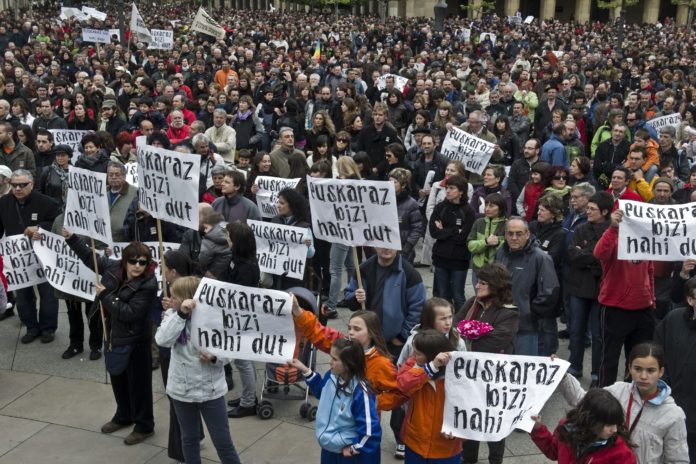The politicisation of Basque has been a subject of debate for us in NAZIOGINTZA since our foundation. We have discussed and written a lot referring to it, and now – through this article – we have decided to address this issue directly.
To begin with, we must clarify the meaning of the term “politicisation”. We want to clarify that we use the word politicisation in a national sense, and we do not wish, in any way, to enter the political dispute in terms of “left” or “right”, or to align ourselves with one political group or another. Our dispute in this area is with the French and Spanish states, which want to impose their language on us. Due to the forced Spanish and French acculturation, and the accumulation of political forces, in recent times Euskal Herria has been undergoing a strong process of de-nationalization, which we have denounced on several occasions (see this link: https://www.naziogintza.eus/en/national-diagnosis-relief-symptoms-or-cure-the-disease/). The erosion of Basque national consciousness is evident and our nation is rapidly dissolving in the vast ocean of Franco-Spanish identity.
In this process of assimilation, the Spanish and French states have used all the instruments and tricks available to them. Knowing that language is the backbone of the nation, they have always tried to weaken the Basque language, but now do so in a more cunning way: instead of banning the Basque language, as they have done for centuries, saying that we must “depoliticize” the Basque language, remove all its political and symbolic value from the Basque language, try to turn it into a sterile language. Not only the Spanish media, but also many politicians, commentators and social actors in our own nation parrot the same slogan: “we must not politicise the Basque language.”
It is curious that those who most politicise (and impose on us) their languages (Article 3 of the Spanish Constitution is clear: all the inhabitants of the Spanish state must know the Spanish language; the same occurs with Article 2 of the French Constitution) are the same ones who tell us that we should not politicise our language. When we suffer any kind of linguistic discrimination, for example, we are told that we should not denounce this publicly, because then we are “politicising” the language. It is evident that the discourse of “de-politicising” the Basque language seeks our linguistic submission.
But not only that. Those who want to undermine the ideological value of the Basque language know very well that behind the language there is a collective symbolic universe, shared cultural values, in a word, a People. Because language places us in the world, and places us as Basques. In fact, language is the fundamental element of “we”, of the national personality, an element that lasts over time, as it is transmitted from generation to generation. Those who want to “de-ideologise” our language know that Euskera gives us individual and collective personality: individual, because it makes us Euskaldunes (Basque-speakers), and collective, because the Basque language makes us a nation. Because Euskera gives the Basque Country its name and essence.
Those who want to take away the ideological value of the Basque language, let’s say it clearly, only seek our de-nationalisation: they want to extract its affective component from our language, they want to destroy the binomial “Euskara-Euskal Herria” and turn our language into something aseptic, neutral, as if it were English or Esperanto, something without a soul. According to them, in short, the language of the Basque Country should not be associated too much with the Basque Country.
Faced with this, we clearly proclaim that Euskara must be given all its political, identity and symbolic weight. That we must politicise Basque, therefore, since it is the fundamental element that makes us a nation.
Let’s clarify one thing: the Basque language is not the exclusive patrimony of a political party or of a specific ideology. Not at all. But that does not mean that we should de-politicise Basque. That is precisely the goal of French and Spanish nationalists who want to weaken Basque nationalism, and also the goal of some Basques who want to “decaffeinate” the concept of language.
The Spanish and French unionists know perfectly well that every time we speak Basque we are making our national identity clear. The request not to politicise Basque has a subliminal message: do not exhibit Basque language and identity — it is dangerous. For this reason, in their attempt to undermine the ideological value of Euskera (or Catalan or Galician), Spaniards often repeat that “languages are simple tools of communication.” The non-Spanish languages of the Iberian Peninsula, of course. Because when they speak their language, Spaniards say that Spanish is the valuable heritage shared by all Spanish-speakers, the one that creates strong emotional and cultural ties between Spain and South America (there is the Spanish feast day of October 12, the day of the “Hispanidad”, the same can be said about the “Francophonie”). But no, we know well that languages are not simple communication tools. Languages are basic elements in the creation of collective identities, they are elements that create cultural and emotional ties between their speakers. If languages were simply communication tools, today we would all speak English.
Wherever there is a language, there is a possible nation. In addition to language, it will be the collective consciousness of its inhabitants that will determine the formation of that nation. Therefore, the political component of the language is evident — and those who want to remove its political burden from the Basque language are well aware of this.
It is unfortunate to see that the same mantra is also fed to us from part of the Basque nationalist world: “we must not politicise the Basque language.” Those who say that generally do not speak Basque regularly. They use the Basque language to pretend, and they speak comfortably in Spanish or French without any special concern. But every Basque patriot should know the importance of language in shaping the nation, and realize that what differentiates Euskal Herria from Spain or France, its main characteristic, is its language, the Basque language. Are we to hide that objective evidence?
Therefore, Basque cannot be given a simple instrumental value, as is done in many of our schools. As it is given to English, for example. It is essential that all students in the Basque Country know that the Basque language is the main column of our collective identity, with all that that means. In this area, we must also politicise the Basque language, as we have mentioned. But we will talk in another article in depth about our Basque educational model.
Yes, without a doubt, Basque has to be politicised. On the one hand, to implement ambitious language policies that allow us to overcome the diglossic situation of our language. And on the other hand, to make it clear that Euskera is not a simple communication tool, but the most obvious symbol that differentiates Euskal Herria from the other nations of the world.








